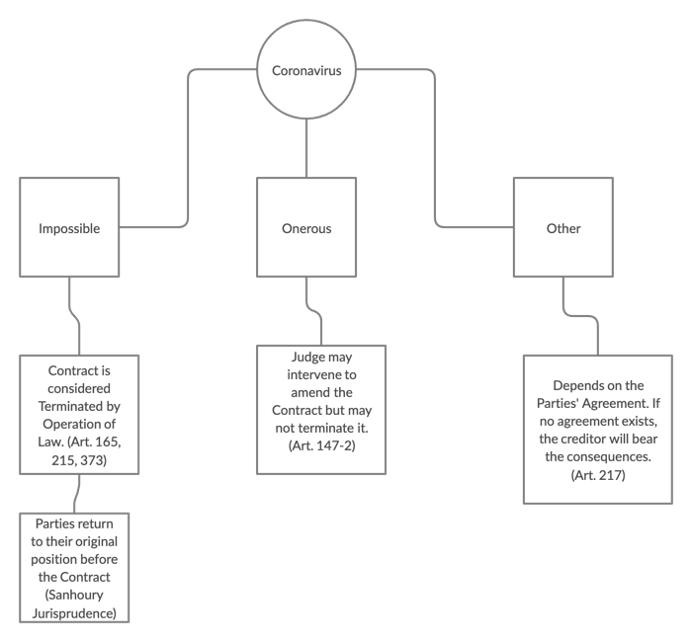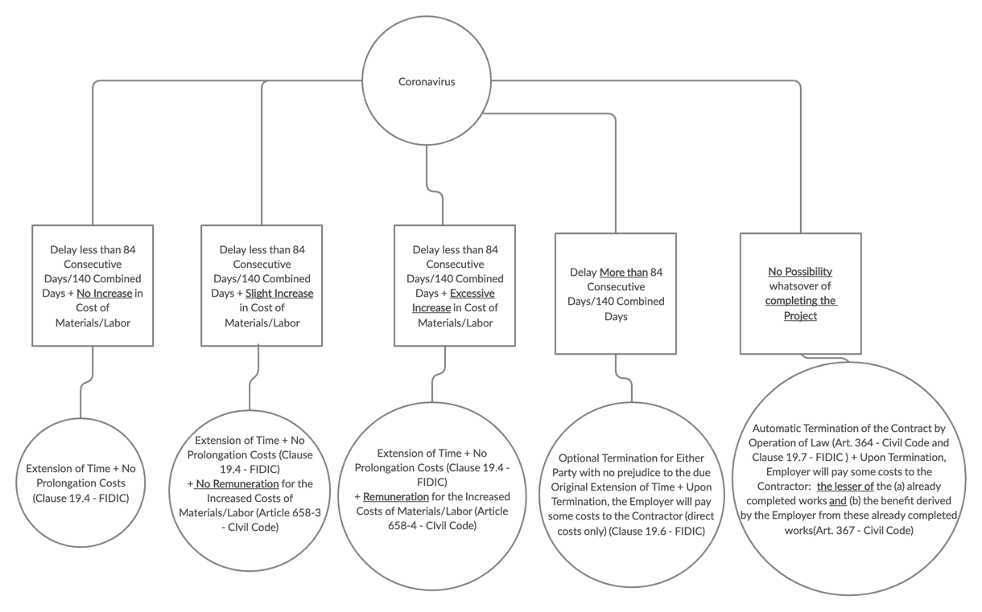Author: Ibrahim Shehata
Introduction
Coronavirus or (COVID-19) has, unfortunately, hit the economies of most countries, causing severe consequences that have impacted almost all industries on a global basis. The Egyptian market is no exception, as there has been a spike in the number of recorded coronavirus cases in Egypt over the past few weeks. The article tries to assess the impact of this pandemic from an Egyptian legal perspective on businesses, generally with a particular focus on the construction industry. Shehata & Partners Law Firm has joined forces with Al-Mansoury International Consultants to shed light on this critical issue and assist the Egyptian construction industry with the legal issues that might arise from a practical standpoint. In this regard, this article is divided into three broad sections: (1) General Impact of Coronavirus on Businesses in Egypt; (2) General Impact of Coronavirus on Construction Contracts in Egypt; (3) Special Impact of Coronavirus on FIDIC 1999 Red Book Construction Contracts concluded under Egyptian Law.
General Impact of Coronavirus on Businesses in Egypt
The first question that comes to mind is how to frame this coronavirus under Egyptian Law. Does such a pandemic fall within the definition of Exceptional Circumstances Theory (as depicted under article 147-2 of the Egyptian Civil Code), or does it meet the definition of force majeure (as referred to under articles 165, 215 and 373 of the Egyptian Civil Code)? The right answer is that it will depend upon the impact of coronavirus on the business itself. No one answer fits all. The question then becomes how far this coronavirus has impacted the market itself. In this respect, we can envisage three different scenarios. The first one where the parties can’t carry out their obligations under their agreement. Under this scenario, the term “impossibility” would be defined narrowly by Egyptian Courts. For instance, there might be an impossibility to carry out one’s obligations under cross-border supply transactions between Egypt and Italy/China. However, this might not be the case with other types of transactions. Under this scenario, the parties return to their original position as if there were no agreement in the first place.
The second scenario will be if the impact does not render the obligation itself impossible but onerous. The Exceptional Circumstances Theory under article 147-2 of the Egyptian Civil Code would apply. Under this scenario, the judge would apply an objective standard looking into the transaction itself and how far the obligor’s expected loss would be regardless of the overall financial position of the impacted party. Such party would be eligible to plead the Exceptional Circumstances Theory if it would suffer a massive loss under such a specific transaction due to coronavirus. Hence, if the coronavirus impact is rendering the obligations to be onerous, then the Judge/Arbitral Tribunal would be entitled to amend the provisions of the agreement between the parties to make it more plausible economically. This does not mean that the losses will be allocated to one party and not the other; it merely means that the excessive loss would be shared between both parties. It must be noted that this provision pertains to Egyptian public policy, and therefore it cannot be evaded by the parties in advance. The third scenario is when the impact of coronavirus is neither having the obligations being impossible or onerous, but a lesser effect. However, there is still a loss under this scenario that would burden one of the parties. In this case, it entirely depends on the parties’ agreement as article (217) of the Egyptian Civil Code entitles the parties to re-allocate such a loss in advance. If no agreement exists, then the creditor would be the one who typically bears the loss under such a scenario. Below is a decision tree that simplistically elaborates on the three scenarios.

General Impact of Coronavirus on Construction Contracts in Egypt
The same scenarios envisaged above apply as well to the Construction Industry. However, there are two main tweaks as follows: First: Under the first scenario, the Egyptian Civil Code provides that the Employer would be liable to compensate the Contractor for the lesser of (a) the costs of any works already completed by the said Contractor and (b) the benefits received by the Employer as arising from such completed works (Art. 667 of the Egyptian Civil Code).
Second: Under the second scenario, the construction projects will continue either during or after the outbreak of the virus the prices of the materials have been drastically inflated due to its availability, in that case, the Egyptian Civil Code (Article 658) provides that if the construction contract is a lump sum and the Employer procures the design, and an economic imbalance occurs due to general exceptional circumstances, then the Judge/Arbitral Tribunal may intervene and either: (a) increase the remuneration of the Contractor, or (b) terminate the construction contract. It must be noted that the increase in the costs of materials/personnel to the extent that the Contractor incurs losses do not warrant any intervention by the Judge/Arbitral Tribunal. However, if the increase in the costs of materials/personnel reaches the level of an excessive loss and is resulted from general exceptional circumstances, then and only then, the Judge/Arbitral Tribunal would be allowed to intervene in the manner mentioned above. It must be noted that this provision as well pertains to Egyptian public policy, and therefore it cannot be evaded by the parties in advance. Even though Article 658 specifies lump sum contracts only, and in the absence of known court decisions related to re-measured agreements, it is the view of the authors that the type of the contract shall have no role to play and does not affect the concept of the economic imbalance in case the material prices were drastically inflated, hence the idea of Article 658, may apply to re-measured contracts as well. As for the third scenario, it is precisely the same here as the case for other types of businesses.
Special Impact of Coronavirus on FIDIC 1999 Red Book Construction Contracts concluded under Egyptian Law
What if the contract entered between the Employer and Contractor is a FIDIC 1999 Red Book (hereinafter referred to as “FIDIC”) whereby the parties agreed to have the Egyptian Law as the Law applicable to the contract, would there be any differences? Each of which is indeed complementing the other with slight variations. First, it has to be mentioned that the first and second scenarios mentioned-above would be the same here as they were under section (B) as supported by clause (19.7) of the FIDIC Red Book.
Where the impact of the coronavirus is only a delay to the project, the FIDIC provides relief to the Contractors from delay damages in the form of entitlement to Extension of Time for Completion but with no costs for such time as provided under clause 19.4 (b) which is in line with Article (217) of the Civil Code. This is because clause 19.4 has reserved the award of prolongation costs to an exhaustive list of events that do not include epidemics or pandemics (acts of God). However, if the impact extends to an increase in the materials or labor costs causing an economic imbalance to the Contractor, these kinds of expenses are not time-related costs (prolongation costs), then Article 658 and 147 of the Civil Code may apply and can results in compensation to the Contractor for the increase in the prices but not the costs of the delay.
In case the coronavirus has caused a prolonged delay (unreasonable delay) to the project, the FIDIC – Clause 19.6 identifies a benchmark for such a delay, i.e., 80 consecutive days or a combined period of 140 days. Below the said benchmark, the Contractor will be entitled to an Extension of Time for Completion only. As for delay above the said benchmark, either party will be entitled to an option to terminate the contract without prejudice to the Contractor’s entitlement to an extension of time until the termination is effective. When the Employer triggers such termination, the latter would be required to pay the Contractor the amounts listed under clause 19.6 of the FIDIC Red Book which, includes only the direct costs incurred by the Contractor but excludes any compensation for loss of profit or indirect consequences of such a termination. Below is a decision tree that tries to illuminate the full picture for 1999 FIDIC Red Book Construction Contracts that are governed by Egyptian Law.
Finally, good record keeping and early legal and contractual advice will always help you in either negotiating better terms to continue your relationship with your clients or reserve your rights when things take a wrong turn. Furthermore, sending timely and proper notices under the contracts essential to preserve your rights concerning this pandemic.








